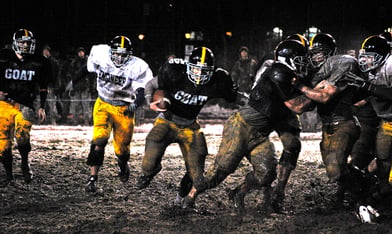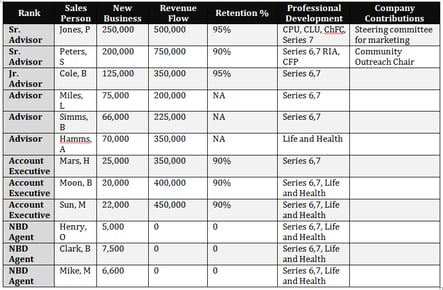I assure you that the military academies are all about performance management. IF it moves, it gets measured.

Ralph Pim and I were watching a competitive sports team practice one day at West Point. Ralph was a professor and Director of Competitive Sports teams at the United States Military Academy at West Point at the time. He was telling me about the coach that was responsible for the company’s competitive football program. He told me that this individual was retired Army and the Academy hired him back to run the program as well as other duties. I asked him, “Why would he retire and then get hired back?” I will do my best to explain what Ralph told me.
In the military, the system works like this:
- In the military, each soldier has a rank.
- You progress up through the ranks based on merit.
- A promotion board (my words) reviews the current career of the soldier and, based on merit and recommendations, either promotes the soldier to the next level or it doesn’t.
- In the military system, there are only so many seats available at each rank in the military. (I’m assuming that that number may go up or down based on the current state of world affairs and the status of military funding.)
- A soldier has only so long to stay in a certain rank. If the soldier gets passed by a certain number of times for promotion, then that soldier is considered “not promotable” and, at some time, is “retired”.
*From Militaryspot.com: Enlisted: Congress passes the Defense Authorization Act each year. This is how the number of Army members that can be on active duty in the upcoming year is determined. By separate legislation, Congress limits what percentage of the total active duty force can serve in each commissioned officer rank, what percentage of the total active duty force can serve in each warrant officer rank, and what percentage of the active duty force can serve in each enlisted rank above the grade of E-4 (there are no statutory limits for E-4 and below). These amounts are then the foundation of the Army enlisted promotion system.
My question is this: why wouldn’t this work in corporate America? More specifically, how could you, as a director of sales, make this work in your organization? How could this become part of your motivation and “upgrading” strategy? You would need to outline your system and then plug your “sales soldiers” into the system to see how it plays out, but let’s give it a shot.
Ranking: Let’s assume you could have ranks that look something like this top to bottom:
- Sr. Advisor
- Jr. Advisor
- Advisor
- Account Executive
- NBD Agent
Depending on the business you are in, you could substitute the word consultant, broker or agent for the word “advisor”.
Criteria: You would need to establish criteria to enter the sales team at a certain level (assuming you are recruiting people) and to be promoted from one level to the next.
- Year of Service – not recommended – years of service have very little bearing on merit or accomplishment. “Survival” is not a solid criteria.
- Annual New Business Production
- Book of Business or Revenue stream
- Company contribution
- Professional designations
- Professional ranking within the industry
- Compliance with and support of company values, vision, mission and objectives
- Stature in the market
Process: You would need a process to acquire the appropriate data and information to make any kind of objective and reasonable determination for promotion.
- Clearly identified metrics for success and established standards that determine success
- Collection of data that support objective reporting of success in achieving metrics in each criteria
- Timing of reviews and announcements of upcoming promotion board hearings
- Criteria to be a promotion board member
- Establish the size – number of people – at each rank. People at the top end of the sales rank would certainly be unlimited. Other than the top and bottom ranks, you will want a fixed number of people at each rank. This is the only way the system works.
- Length of time someone can stay in a rank or…
- The number of times someone can be passed for promotion before being “retired”.
I’m confident that you can think of additional ops and procedures that would need to go into this process. Establishing the process is secondary to determining if your current system and process for upgrading your sales team and promoting people (giving them new titles vs earning new titles or ranks) is actually accomplishing what it should accomplish: Motivating your sales team to perform at or exceed expected and required levels of performance.
Too often, I’ve been part of discussions about the lack of performance of very senior people and new hires. Too often, I’ve heard excuses about them being protected classes, managing big books of business or have only been with the firm for a year. I get it. Making decisions that impact people’s lives and the lives of their family is important and serious work. And because it’s serious work, a company should have a serious approach to upgrading the team. The company should have a serious communication process that lets everyone know exactly what the rules are and what it takes to get promoted with the team, what it takes to stay on the team and what happens when there is failure to execute as expected.
Imagine for minute the following scenario:

With this type of structure/system, you would have a career path method that is clear and objectively determined. This will help the right people continue to be motivated to perform as expected when you hired them. It will give you a better method to determine what to do with those that “have retired on the job.”
You may not want to position this as a “military style” of managing, as that may not be consistent with your style or your company culture. But performance management is the fundamental contributing factor for having a team built for sales growth.
Additional Resources:
Sales Management – Complimentary Book on The Extraordinary Sales Manager
Setting Standards – Video – What if you gave your best!
National Webinar Series for Sales Management – to inquire how you can participate call 513.791.3458 and ask for Jeni Wehrmeyer or email: jeni@anthonycoletraining.com. Subject line: Participate in National Webinars




